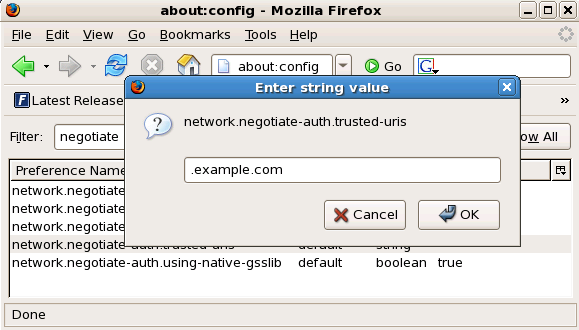48.3.5. Configuring Firefox to use Kerberos for SSO
You can configure Firefox to use Kerberos for Single Sign-on. In order for this functionality to work correctly, you need to configure your web browser to send your Kerberos credentials to the appropriate KDC.The following section describes the configuration changes and other requirements to achieve this.
- In the address bar of Firefox, type
about:configto display the list of current configuration options. - In the Filter field, type
negotiateto restrict the list of options. - Double-click the network.negotiate-auth.trusted-uris entry to display the Enter string value dialog box.
- Enter the name of the domain against which you want to authenticate, for example, .example.com.
- Repeat the above procedure for the network.negotiate-auth.delegation-uris entry, using the same domain.
Note
You can leave this value blank, as it allows Kerberos ticket passing, which is not required.If you do not see these two configuration options listed, your version of Firefox may be too old to support Negotiate authentication, and you should consider upgrading.

Figure 48.6. Configuring Firefox for SSO with Kerberos
You now need to ensure that you have Kerberos tickets. In a command shell, type
kinit to retrieve Kerberos tickets. To display the list of available tickets, type klist. The following shows an example output from these commands:
48.3.5.1. Troubleshooting
링크 복사링크가 클립보드에 복사되었습니다!
If you have followed the configuration steps above and Negotiate authentication is not working, you can turn on verbose logging of the authentication process. This could help you find the cause of the problem. To enable verbose logging, use the following procedure:
- Close all instances of Firefox.
- Open a command shell, and enter the following commands:
export NSPR_LOG_MODULES=negotiateauth:5 export NSPR_LOG_FILE=/tmp/moz.log
export NSPR_LOG_MODULES=negotiateauth:5 export NSPR_LOG_FILE=/tmp/moz.logCopy to Clipboard Copied! Toggle word wrap Toggle overflow - Restart Firefox from that shell, and visit the website you were unable to authenticate to earlier. Information will be logged to
/tmp/moz.log, and may give a clue to the problem. For example:-1208550944[90039d0]: entering nsNegotiateAuth::GetNextToken() -1208550944[90039d0]: gss_init_sec_context() failed: Miscellaneous failure No credentials cache found
-1208550944[90039d0]: entering nsNegotiateAuth::GetNextToken() -1208550944[90039d0]: gss_init_sec_context() failed: Miscellaneous failure No credentials cache foundCopy to Clipboard Copied! Toggle word wrap Toggle overflow This indicates that you do not have Kerberos tickets, and need to runkinit.
If you are able to run
kinit successfully from your machine but you are unable to authenticate, you might see something like this in the log file:
-1208994096[8d683d8]: entering nsAuthGSSAPI::GetNextToken() -1208994096[8d683d8]: gss_init_sec_context() failed: Miscellaneous failure Server not found in Kerberos database
-1208994096[8d683d8]: entering nsAuthGSSAPI::GetNextToken()
-1208994096[8d683d8]: gss_init_sec_context() failed: Miscellaneous failure
Server not found in Kerberos database
This generally indicates a Kerberos configuration problem. Make sure that you have the correct entries in the [domain_realm] section of the
/etc/krb5.conf file. For example:
.example.com = EXAMPLE.COM example.com = EXAMPLE.COM
.example.com = EXAMPLE.COM
example.com = EXAMPLE.COM
If nothing appears in the log it is possible that you are behind a proxy, and that proxy is stripping off the HTTP headers required for Negotiate authentication. As a workaround, you can try to connect to the server using HTTPS instead, which allows the request to pass through unmodified. Then proceed to debug using the log file, as described above.